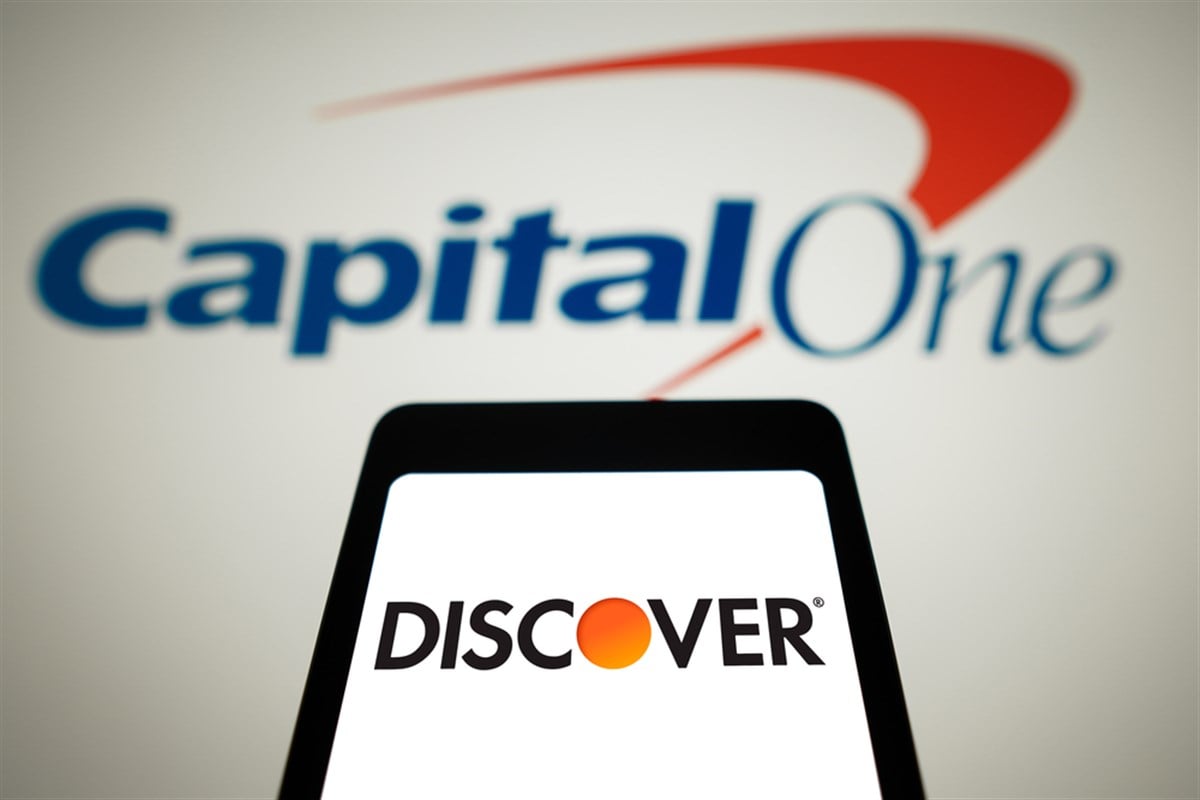
What’s in your wallet? In the not-so-distant future, it might be a card issued by the combined entity of Capital One Financial Corp. (NYSE: COF) and Discover Financial Services (NYSE: DFS).
Capital One offered to buy Discover for $35.3 billion in an all-stock deal. This would be a blockbuster deal in the financial services arena, with effects throughout the sector.
One big investor in Capital One is Warren Buffett, and analysts believe he may be among those pushing for the company to become a bigger player in the growing and competitive business for credit card transactions.
Rival to existing financial giants
The acquisition, if OK’d by regulators, would make Capital One a rival not only to credit card processing giants Visa Inc. (NYSE: V) and Mastercard Inc. (NYSE: MA), but also put it in the same league as American Express Co. (NYSE: AXP), which operates as both a bank and a processing network.
Credit-card stocks trade lower
Visa and Mastercard gapped down on news of the proposed acquisition; American Express was trading lower, but finding support at its 10-day moving average.
The Capital One chart shows the stock initially gapping lower on the news, which often happens to an acquiring company’s stock. However, as the market digested the potential for the deal, Capital One stock finished higher and is finding support near its 10-day line.
On the Discover Financial Services chart, you’ll see the stock gapping 12.61% higher on the news. Stock of an acquisition target often gaps up when a deal is announced, as investors bid up shares close to the acquirer’s offer price, which in this case is $140 per share.
Discover stock was trading between $122 and $123 on February 21.
Here are 3 reasons why Capital One’s acquisition of Discover would be significant among finance stocks.
1. Expansion of Discover network
A chief aim of the deal is to grow Discover’s payment network, which is currently smaller than Visa’s or Mastercard’s.
In a call with Investors, Capital One CEO Richard Fairbank said all Capital One debit cards would eventually be transferred from Mastercard’s network to Discover’s. That’s one reason Mastercard gapped down hard on the news; Capital One currently issues cards using the Mastercard network.
That transition will take some time, as Discover doesn’t have the same foothold outside the U.S. as Visa and Mastercard.
2. A twist on regulatory scrutiny
Biden Administration antitrust regulators have been active in showing disapproval of mergers.
At first glance, it might seem as if Washington would recoil at the idea of two financial services giants teaming up, but the picture may be rosier than it seems.
Visa, Mastercard and American Express together command 96% of market share for credit card transactions, according to payments researcher Nilson.
If the Federal Government is interested in spreading the wealth among more companies rather than having it so concentrated, this proposed merger is a gift.
There’s the question of whether the proposed merger will result in higher fees for consumers, which is something Washington will examine. However, Capital One does not have a history of gouging customers.
Capital One bills itself as “the only major bank with no fees, no minimums, and no overdraft fees.”
According to the news release issued by Capital One and Discover:
- The transaction is expected to generate expense synergies of $1.5 billion in 2027.
- That’s 26% of Discover operating expenses, plus 10% of Discover marketing expenses.
- The acquisition is expected to generate network synergies of $1.2 billion in 2027, driven by adding Capital One debit purchase volume and selected credit card purchase volume to the Discover network.
The companies are fully aware those claims are a signal to Washington regulators that the intention is to pass cost savings along to consumers.
In addition, some analysts believe the combined entity could bring more rewards points to Discover card holders.
3. Similarities to American Express
Discover operates a third-party network, meaning that its cards are based on an underlying bank. Because Capital One is a bank, the combination of the two companies opens up product opportunities currently only available to American Express.
That makes Capital One a massive vertically integrated consumer financial services company that’s analogous to American Express.
For example, American Express has made a name for itself with premium products, something neither Capital One nor Discover has focused on. The merger, which brings significant combined capabilities, could change that.














